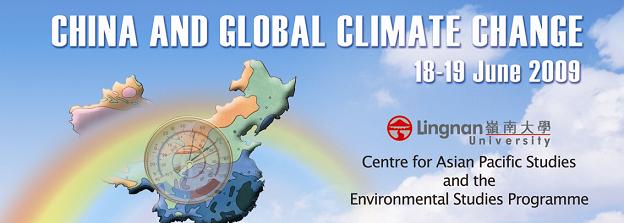
Event Title
Conference on China and Global Climate Change : Reconciling International Fairness and Protection of the Atmospheric Commons
Location
AM308, Lingnan University
Start Date
18-6-2009 4:00 PM
End Date
18-6-2009 5:00 PM
Language
English
Description
This study examines the Sino-EU’s post-Kyoto negotiations for combating climate change from 2007 to 2008, and answers the question why the EU could not lead China to adopt the post-Kyoto quantitative reduction targets on greenhouse gases by exploring the characteristics of China’s climate negotiation strategy.
This study argues that until the end of 2008, the reason that the “tug of war” between China and the EU did not result in any new perspectives or feasible outcomes is due to China’s reluctance of adopting the post-Kyoto quantitative reduction target and the EU’s lack of leadership. Both China and the EU wanted to gain as much as possible from the other side through minimal effort.
This study also argues that since the beginning of 2007, in the Sino-EU’s post-Kyoto negotiations, the Chinese government reversed its passive position gradually and reached its objectives, which were to refuse binding quantitative objectives, keep a responsible stakeholder image, and gain international support, which included funding and technology transfers, by using its advance and retreat strategy. On the other hand, the EU’s role in the negotiations has switched gradually from leading to waiting and seeing.
Chapter I of this study introduces how China has been involved in the post-Kyoto negotiations. Chapters II, III, IV analyze China’s advance and retreat negotiation strategy. The last chapter concludes this study.
Document Type
Presentation
Recommended Citation
Qiao, Y. (2009). Reverse positions: Can China be the winner in Sino-EU’s post-Kyoto negotiations of combating climate change? In China and global climate change: Proceedings of the conference held at Lingnan University, Hong Kong, 18-19 June 2009 (pp. 269-283). Centre for Asian Pacific Studies and the Environmental Studies Programme, Lingnan University, Hong Kong.
Included in
Reverse positions : can China be the winner in Sino-EU’s post-Kyoto negotiations of combating climate change?
AM308, Lingnan University
This study examines the Sino-EU’s post-Kyoto negotiations for combating climate change from 2007 to 2008, and answers the question why the EU could not lead China to adopt the post-Kyoto quantitative reduction targets on greenhouse gases by exploring the characteristics of China’s climate negotiation strategy.
This study argues that until the end of 2008, the reason that the “tug of war” between China and the EU did not result in any new perspectives or feasible outcomes is due to China’s reluctance of adopting the post-Kyoto quantitative reduction target and the EU’s lack of leadership. Both China and the EU wanted to gain as much as possible from the other side through minimal effort.
This study also argues that since the beginning of 2007, in the Sino-EU’s post-Kyoto negotiations, the Chinese government reversed its passive position gradually and reached its objectives, which were to refuse binding quantitative objectives, keep a responsible stakeholder image, and gain international support, which included funding and technology transfers, by using its advance and retreat strategy. On the other hand, the EU’s role in the negotiations has switched gradually from leading to waiting and seeing.
Chapter I of this study introduces how China has been involved in the post-Kyoto negotiations. Chapters II, III, IV analyze China’s advance and retreat negotiation strategy. The last chapter concludes this study.

